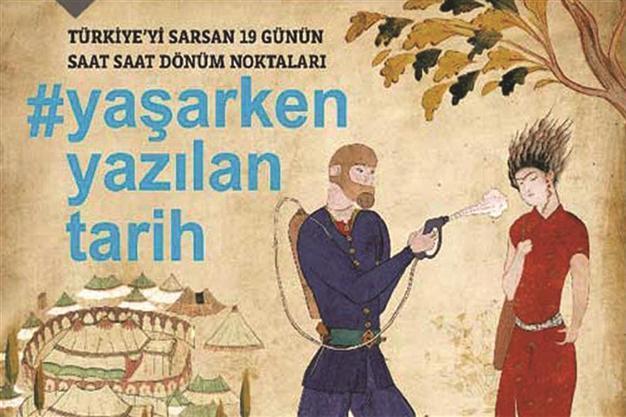Censored Turkish magazine releases ‘Gezi Park’ issue online after closing
ISTANBUL - Hürriyet Daily News

Doğuş Broadcasting Group declared last week that NTV Tarih had been terminated, leading the staff to announce that they would publish the July issue online.
Recently folded history magazine NTV Tarih has uploaded its last issue online, one week after its owners disbanded the publication and refused to publish the final edition due to its coverage of the Gezi Park protests.
Doğuş Broadcasting Group declared last week that NTV Tarih had been terminated, leading the staff to announce that they would publish the July issue on the Internet. NTV Tarih’s crew put the magazine online yesterday at the
website www.yasarkenyazilantarih.com (History written while it’s lived).
Gürsel Göncü, the chief editor of NTV Tarih, said they had devoted the magazine’s cover to the Gezi Park incidents, but they did not do anything "out of the ordinary" with it.
The magazine’s cover shows an Oriental-style rendition of the now-classic Reuters photo of a police officer gassing “the woman in red.”
“We are a history magazine. We did the same as we had been doing for the past four-and-a-half years,” Göncü told the Hürriyet Daily News. According to Göncü, though NTV Tarih would no longer be published within the Doğuş Group, he and the rest of the crew were determined to publish it with their own resources.
He said NTV Tarih had a circulation of around 35,000, which consisted of readers from different layers but that they intended to reach wider masses. “For now, we have put the unpublished issue on the Internet. We hope to have a new formation in a few months,” the editor said.
Drawing attention to the issue of the growing pressure on journalists, Göncü said they had not abandoned up what they believed to be right. “Journalists have started to cringe; we have not conceded the things we believe are right. Everything has started to be perceived as political in this country. History is being viewed through contemporary and political positions rather than pure history,” said Göncü.
